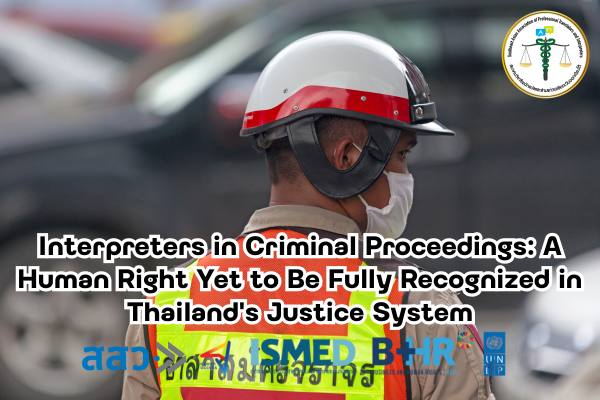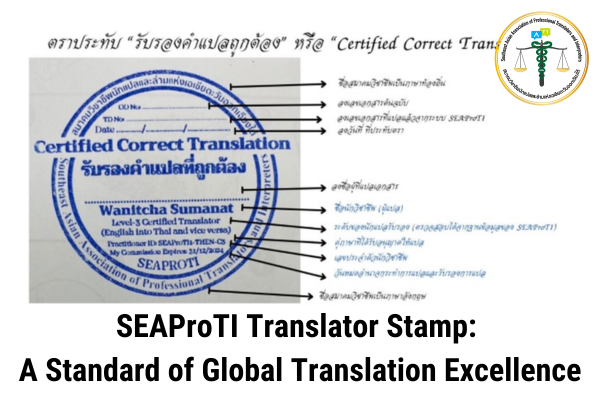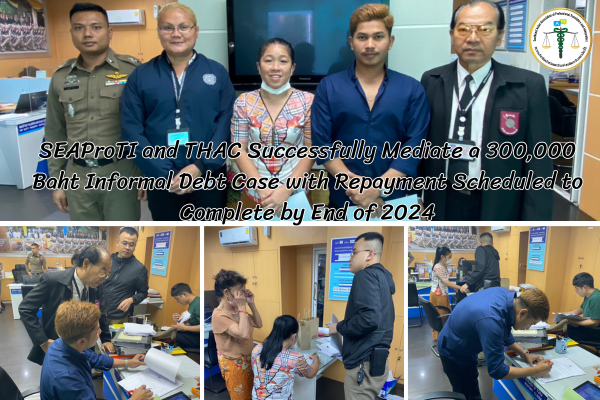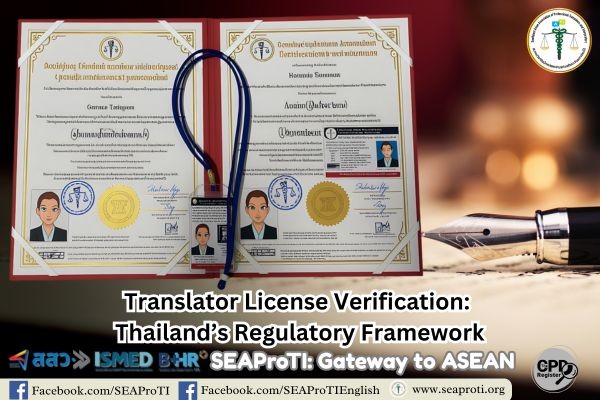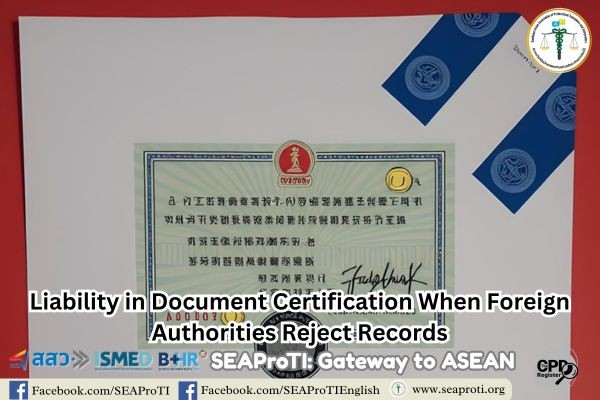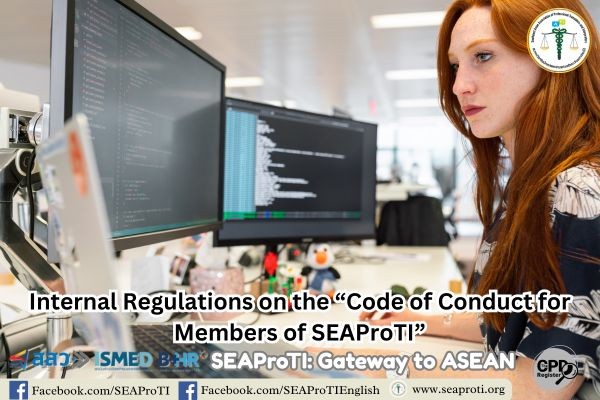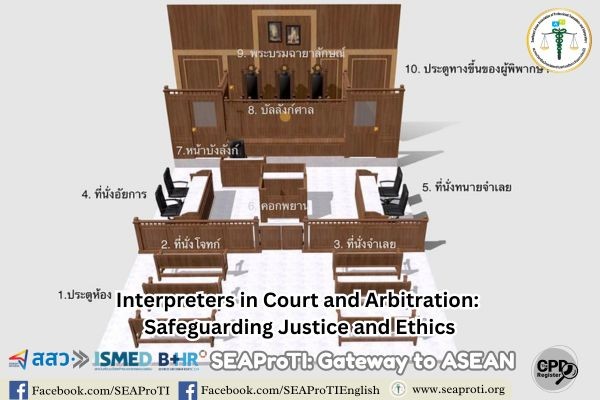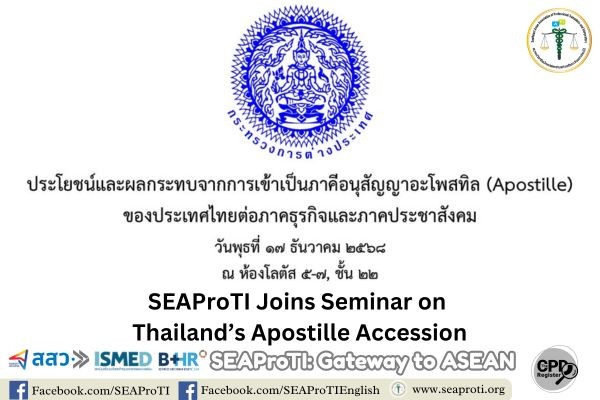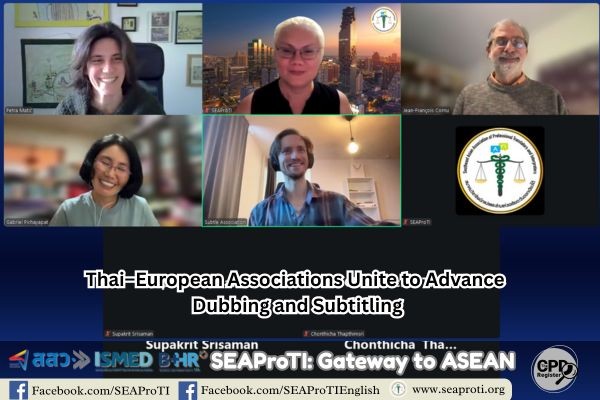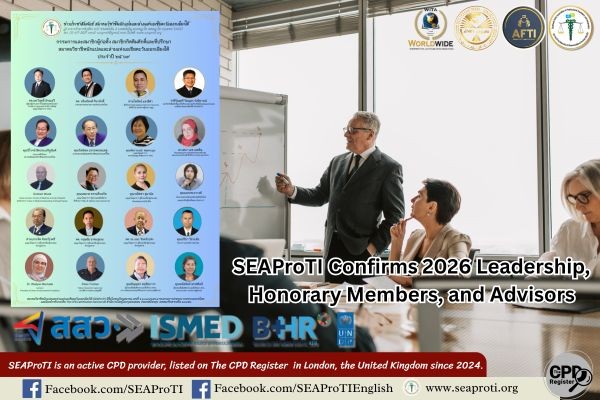Interpreters in Criminal Proceedings: A Human Right Yet to Be Fully Recognized in Thailand’s Justice System
24 May 2025, Bangkok – In criminal proceedings, the right of defendants to understand the charges against them and to communicate effectively is a cornerstone of justice. If a person cannot understand the language used in court, they cannot meaningfully defend themselves—regardless of whether they are represented by a lawyer. The right to an interpreter is therefore not merely a “convenience,” but a fundamental human right enshrined in international law.
The International Human Rights Framework: ICCPR Article 14
Original English text:
ICCPR, Article 14(3), (a) and (f):
In the determination of any criminal charge against him, everyone shall be entitled to the following minimum guarantees, in full equality:
(a) To be informed promptly and in detail in a language which he understands of the nature and cause of the charge against him;
(f) To have the free assistance of an interpreter if he cannot understand or speak the language used in court.
Thailand is a State Party to the International Covenant on Civil and Political Rights (ICCPR), which is legally binding under international law. Article 14(3)(a) and (f) specifically state:
(a) “Everyone shall have the right to be informed promptly and in detail, in a language which he understands, of the nature and cause of the criminal charge against him.”
(f) “To have the free assistance of an interpreter if he cannot understand or speak the language used in court.”
These provisions protect the right to informed participation and fair communication in legal proceedings, ensuring that no one is convicted without understanding the content and implications of the charges.
The Situation in Thailand: A Structural Problem
Although Thai courts do provide interpreters in some cases, the practical reality reveals systemic shortcomings:
- There is no subsidiary law or Act that officially defines qualifications for interpreters in criminal proceedings.
- Police officers or defense lawyers often choose ad hoc interpreters such as friends, relatives, or even students—with no assessment of skills or training.
- In some cases, interpreters are used only partially (e.g., during specific parts of proceedings), or are instructed not to translate everything, effectively stripping the defendant of their rights in practice.
Policy Recommendations
- Enact legislation on interpreters in criminal proceedings that makes the provision of interpreters for defendants who do not understand Thai a state duty, not a discretionary act of sympathy.
- Define qualifications and mandatory training for criminal court interpreters based on human rights standards—covering legal literacy, ethics, and confidentiality.
- Prohibit the use of students as interpreters or the use of relatives of defendants and even state officials with a vested interest, such as police officers, from acting as interpreters.
Why Officials or Relatives Must Not Serve as Interpreters
The use of state officials or related parties as interpreters in criminal cases undermines justice for the following key reasons:
Violation of Impartiality
- Interpreters must be neutral language mediators.
- Police are typically complainants or investigators—this creates conflict of interest.
- Relatives may intentionally or unintentionally distort meanings in favor of their loved ones.
ICCPR Article 14 requires a fair trial, which cannot exist where bias—particularly through language—is present.
Violation of Access to Justice
- If the interpreter lacks neutrality or competence:
- The defendant cannot fully understand the charges (ICCPR 14(3)(a))
- They cannot consult their lawyer effectively
- Their testimony may not reflect their genuine intent
→ This results in an unfair trial, and may render the verdict legally challengeable under international law.
Risk of Distortion or Manipulation
A biased interpreter may:
- Omit, selectively translate, or misrepresent key statements
- Pressure the defendant using linguistic coercion
→ These risks have led to overturned verdicts in several countries based on forensic linguistic evidence.
Lack of Professional and Ethical Standards
- Police, relatives, or untrained acquaintances are not professional interpreters:
- They are not trained in interpreter ethics
- They do not understand confidentiality obligations
- They are often unaware of the limitations of their role (e.g., no opinions, no omissions)
Policy Proposals (Continued)
- A law or regulation must explicitly prohibit police officers, relatives, or other parties with a vested interest from acting as interpreters in criminal proceedings.
- Interpreter appointments must be overseen by courts or neutral state institutions.
- Interpreters must be certified by recognized bodies, such as SEAProTI, CIOL, NAATI, etc.
- ICCPR standards must be integrated into Thai constitutional interpretation and judicial practices to elevate human rights protections in the criminal justice system.
Conclusion
Providing interpreters is not an act of goodwill—it is a legal obligation under international human rights law. Without trained, neutral, and competent interpreters, Thailand’s criminal justice process risks violating the basic rights of defendants, eroding the integrity of the courts and damaging the country’s international reputation.
SEAProTI’s certified translators, translation certification providers, and certified interpreters:
The Southeast Asian Association of Professional Translators and Interpreters (SEAProTI) has officially announced the criteria and qualifications for individuals to register as “Certified Translators,” “Translation Certification Providers,” and “Certified Interpreters” under the association’s regulations. These guidelines are detailed in Sections 9 and 10 of the Royal Thai Government Gazette, issued by the Secretariat of the Cabinet under the Office of the Prime Minister of the Kingdom of Thailand, dated July 25, 2024, Volume 141, Part 66 Ng, Page 100.
To read the full publication, visit: the Royal Thai Government Gazette
ล่ามในคดีอาญา: สิทธิมนุษยชนที่ยังไม่ถูกยอมรับอย่างเต็มที่ในกระบวนการยุติธรรมไทย
24 พฤษภาคม 2568, กรุงเทพมหานคร – ในกระบวนการยุติธรรมทางอาญา สิทธิของผู้ต้องหาและจำเลยที่จะเข้าใจข้อกล่าวหาและสามารถสื่อสารอย่างมีประสิทธิภาพ เป็นหัวใจของความยุติธรรม หากบุคคลหนึ่งไม่เข้าใจภาษาที่ใช้ในศาล เขาย่อมไม่สามารถปกป้องตนเองได้อย่างมีประสิทธิภาพ ไม่ว่าจะมีทนายหรือไม่ก็ตาม สิทธิในการใช้ล่ามจึงไม่ใช่เพียง “ความสะดวก” แต่เป็น สิทธิมนุษยชนขั้นพื้นฐาน ที่ได้รับการรับรองในกฎหมายระหว่างประเทศ
กรอบสิทธิมนุษยชนสากล: ICCPR มาตรา 14
ต้นฉบับภาษาอังกฤษ: ICCPR, Article 14(3), (a) and (f): In the determination of any criminal charge against him, everyone shall be entitled to the following minimum guarantees, in full equality: (a) To be informed promptly and in detail in a language which he understands of the nature and cause of the charge against him; … (f) To have the free assistance of an interpreter if he cannot understand or speak the language used in court;
ประเทศไทยเป็นภาคีของ กติการะหว่างประเทศว่าด้วยสิทธิพลเมืองและสิทธิทางการเมือง (International Covenant on Civil and Political Rights: ICCPR) ซึ่งมีผลผูกพันตามกฎหมายระหว่างประเทศ โดยเฉพาะบทบัญญัติใน มาตรา 14 วรรค 3 (a) และ (f) ที่ระบุว่า:
(a) “บุคคลทุกคนมีสิทธิที่จะได้รับแจ้งโดยเร็วและโดยละเอียด ในภาษาที่เขาเข้าใจ เกี่ยวกับลักษณะและสาเหตุของข้อกล่าวหาทางอาญาที่มีต่อเขา”
(f) “มีสิทธิได้รับความช่วยเหลือจากล่ามโดยไม่เสียค่าใช้จ่าย หากเขาไม่เข้าใจหรือไม่สามารถพูดภาษาที่ใช้ในศาลได้”บทบัญญัตินี้มุ่งคุ้มครอง สิทธิในการรับรู้ การมีส่วนร่วม และการสื่อสารอย่างเป็นธรรม ของผู้ต้องหาในกระบวนการพิจารณาคดี เพื่อป้องกันไม่ให้บุคคลถูกตัดสินโดยไม่เข้าใจเนื้อหาของคดี
สถานการณ์ในประเทศไทย: ปัญหาเชิงโครงสร้าง
แม้ศาลไทยจะมีแนวปฏิบัติในการจัดหาล่ามในบางกรณี แต่ในทางปฏิบัติกลับพบว่า:
- ไม่มี กฎหมายลูกหรือพระราชบัญญัติ ที่กำหนดคุณสมบัติล่ามในคดีอาญาอย่างเป็นทางการ
- เจ้าหน้าที่ตำรวจหรือทนายจำเลยอาจเลือกบุคคลทั่วไป เช่น เพื่อน ญาติ หรือแม้แต่นักเรียน มาเป็นล่าม โดยไม่มีการประเมินทักษะหรือการอบรมใด ๆ
- บางกรณีล่ามถูกใช้อย่างจำกัด (เช่น แปลเฉพาะบางช่วง) หรือไม่ให้แปลทั้งหมด อันเป็นการตัดสิทธิของผู้ต้องหาโดยพฤตินัย
ข้อเสนอเชิงนโยบาย
- ตรากฎหมายล่ามในคดีอาญา ที่กำหนดให้การจัดหาล่ามแก่ผู้ต้องหาที่ไม่เข้าใจภาษาไทย เป็นหน้าที่ของรัฐ ไม่ใช่ความเมตตาหรือจัดให้เพราะเห็นอกเห็นใจ แต่จะต้องเป็นหน้าที่ที่ต้องทำตามกติการะหว่างประเทศว่าด้วยสิทธิพลเมืองและสิทธิทางการเมือง โดยเฉพาะบทบัญญัติใน มาตรา 14 วรรค 3 (a) และ (f)
- กำหนดคุณสมบัติและการอบรมล่ามในคดีอาญา โดยอิงตามมาตรฐานสิทธิมนุษยชน เช่น ความเข้าใจด้านกฎหมายขั้นพื้นฐาน จริยธรรม และความลับ
- การใช้ล่ามในกระบวนการทางอาญาในประเทศไทยที่ยังละเมิดสิทธิมนุษยชนในปัจจุบัน ได้แก่
- พนักงานสอบสวนไทยใช้ล่ามที่เป็นนักศึกษา ซึ่งเป็นล่ามที่ขาดทักษะ ไม่มีความรู้ความสามารถที่เพียงพอที่จะทำล่าม
- หรือใช้ญาติของผู้ต้องหาเอง หรือแม้แต่เจ้าหน้าที่รัฐ ที่ไม่มีความเป็นกลาง และอาจมีวาระซ่อนเร้นจากการปฏิบัติหน้าที่
- การใช้ล่ามในกระบวนการทางอาญาในประเทศไทยที่ยังละเมิดสิทธิมนุษยชนในปัจจุบัน ได้แก่
- ห้ามเจ้าหน้าที่ของรัฐที่มีส่วนได้เสียในคดี เช่น ตำรวจ หรือญาติผู้เกี่ยวข้อง ทำหน้าที่ล่าม
- การ ห้ามเจ้าหน้าที่ของรัฐที่มีส่วนได้เสียในคดี เช่น ตำรวจ หรือญาติของผู้เกี่ยวข้อง ทำหน้าที่ล่ามในคดีอาญา มีเหตุผลสำคัญในแง่ หลักนิติธรรม หลักจริยธรรม และสิทธิมนุษยชน ดังนี้:
- ขัดต่อหลักความเป็นกลาง (Impartiality)
- ล่ามในกระบวนการยุติธรรมต้องทำหน้าที่เป็น “คนกลางทางภาษา” ไม่ฝักใฝ่ฝ่ายใด
- ตำรวจเป็นผู้กล่าวหา หรือมีบทบาทในกระบวนการสอบสวน หากให้ทำหน้าที่ล่าม อาจเกิด “อคติ” หรือ “ผลประโยชน์ทับซ้อน” (Conflict of Interest) ได้
- ญาติผู้เสียหาย หรือญาติผู้ต้องหา อาจแปลข้อความให้เป็นคุณแก่ฝ่ายตน หรือแปลผิดโดยรู้เท่าไม่ถึงการณ์เพื่อช่วยเหลือกัน
- ICCPR Article 14 ต้องการให้กระบวนการยุติธรรมเป็น “fair trial” อย่างแท้จริง ซึ่งหมายความว่า ต้อง ไม่มีอคติแฝงในทุกระดับ โดยเฉพาะการสื่อสารผ่านล่าม
- ละเมิดสิทธิของผู้ต้องหาในการเข้าถึงความยุติธรรม (Access to Justice) หากผู้ต้องหาไม่เข้าใจภาษา แต่ล่ามที่จัดให้นั้น ไม่เป็นกลาง หรือ ไม่มีคุณสมบัติเหมาะสม ผู้ต้องหาจะไม่สามารถ:
- เข้าใจข้อกล่าวหาอย่างแท้จริง (ขัดต่อ ICCPR 14(3)(a))
- ปรึกษาทนายอย่างมีประสิทธิภาพ
- ให้คำให้การที่สะท้อนเจตนาโดยแท้จริงผลลัพธ์คือ “กระบวนการไม่เป็นธรรม” (Unfair Trial) ซึ่งอาจทำให้คำพิพากษาถูกเพิกถอน และเป็นการละเมิดพันธกรณีระหว่างประเทศของไทย
- เสี่ยงต่อการบิดเบือนหรือปรุงแต่งคำแปล (Distortion and Manipulation) หากผู้แปลมีส่วนได้เสียกับผลของคดี อาจ:
- แปลไม่ครบ แปลเฉพาะบางตอนที่เป็นคุณแก่ฝ่ายตน
- ละเว้นข้อความสำคัญที่เป็นโทษ
- ปรุงแต่งคำให้ความหมายเปลี่ยนไป
- กดดันผู้ต้องหาโดยใช้ “ภาษา” เป็นเครื่องมือบีบบังคับ (linguistic coercion)
- เหตุการณ์เช่นนี้เกิดขึ้นจริงในหลายประเทศ และเป็นหลักฐานทางนิติภาษาศาสตร์ในหลายคดีที่ถูกตีตกภายหลัง เพราะใช้ล่ามที่มีอคติ
- ขาดมาตรฐานวิชาชีพและการควบคุมจริยธรรม ตำรวจ ญาติ หรือคนรู้จักของผู้เกี่ยวข้อง ไม่ใช่ล่ามวิชาชีพ พวกเขา:
- ไม่ผ่านการอบรมจริยธรรมวิชาชีพล่าม
- ไม่เข้าใจหลัก confidentiality (การรักษาความลับ)
- ไม่ทราบข้อจำกัดของบทบาทล่าม (เช่น ห้ามแทรกแซง แสดงความเห็น หรือแปลตามอำเภอใจ)
- ข้อเสนอเชิงนโยบาย
- ต้องมีกฎหมายหรือระเบียบห้ามเด็ดขาดไม่ให้เจ้าหน้าที่ตำรวจ ญาติ หรือบุคคลที่มีส่วนได้เสียทำหน้าที่ล่าม
- การแต่งตั้งล่ามต้องอยู่ภายใต้การควบคุมของศาล หรือหน่วยงานที่เป็นกลางเท่านั้น
- ล่ามต้องผ่านการรับรองตามมาตรฐาน เช่น SEAProTI, CIOL, NAATI ฯลฯ
- ขัดต่อหลักความเป็นกลาง (Impartiality)
- การ ห้ามเจ้าหน้าที่ของรัฐที่มีส่วนได้เสียในคดี เช่น ตำรวจ หรือญาติของผู้เกี่ยวข้อง ทำหน้าที่ล่ามในคดีอาญา มีเหตุผลสำคัญในแง่ หลักนิติธรรม หลักจริยธรรม และสิทธิมนุษยชน ดังนี้:
- บูรณาการ ICCPR เข้ากับการตีความรัฐธรรมนูญไทย และแนวทางการพิจารณาคดีของศาลยุติธรรม เพื่อยกระดับมาตรฐานสิทธิมนุษยชนสากลให้เป็นจริงในระบบศาลไทย
บทสรุป
การจัดหาล่ามไม่ใช่การ “ช่วยเหลือ” อย่างมีน้ำใจ แต่เป็น สิทธิตามกฎหมายระหว่างประเทศ ที่รัฐไทยมีพันธกรณีต้องเคารพและปฏิบัติตาม หากขาดล่ามที่เป็นกลาง มีทักษะ และได้มาตรฐาน การพิจารณาคดีอาญาทั้งระบบอาจถูกตีความว่า ละเมิดสิทธิขั้นพื้นฐานของผู้ต้องหา ซึ่งบั่นทอนความน่าเชื่อถือของกระบวนการยุติธรรมในสายตาของประชาชนและประชาคมโลก
เกี่ยวกับนักแปลรับรอง ผู้รับรองการแปล และล่ามรับรองของสมาคมวิชาชีพนักแปลและล่ามแห่งเอเชียตะวันออกเฉียงใต้
สมาคมวิชาชีพนักแปลและล่ามแห่งเอเชียตะวันออกเฉียงใต้ (SEAProTI) ได้ประกาศหลักเกณฑ์และคุณสมบัติผู้ที่ขึ้นทะเบียนเป็น “นักแปลรับรอง (Certified Translators) และผู้รับรองการแปล (Translation Certification Providers) และล่ามรับรอง (Certified Interpreters)” ของสมาคม หมวดที่ 9 และหมวดที่ 10 ในราชกิจจานุเบกษา ของสำนักเลขาธิการคณะรัฐมนตรี ในสำนักนายกรัฐมนตรี แห่งราชอาณาจักรไทย ลงวันที่ 25 ก.ค. 2567 เล่มที่ 141 ตอนที่ 66 ง หน้า 100 อ่านฉบับเต็มได้ที่: นักแปลรับรอง ผู้รับรองการแปล และล่ามรับรอง


